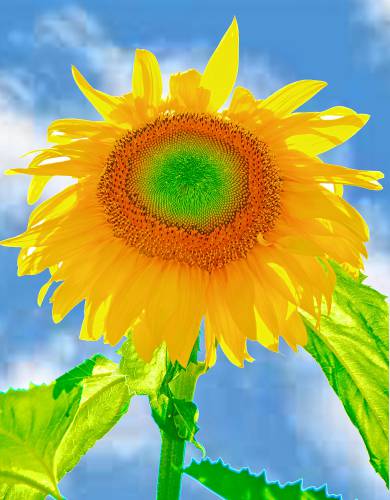Opinion: Returning to an ecological way of being

Jean Stimmell photo Jean Stimmell photo
| Published: 06-08-2024 7:30 AM |
Jean Stimmell, retired stone mason and psychotherapist, lives in Northwood and blogs at jeanstimmell.blogspot.com
I enjoyed doing the research for my gardening essay last week. It enticed me to dig deeper into the essence of gardening. I started reading “Orwell’s Roses” by Rebecca Solnit, a book I had never finished, a frequent failing of mine. I wanted to find out more about how Orwell’s gardening affected his writing and his philosophy of life.
Orwell tells us that working in a garden is the opposite of the disembodied uncertainties of writing. “It’s vivid to all the senses, it’s a space of bodily labor, of getting dirty in the best and most literal way, an opportunity to see immediate and unarguable effect. At the end of the day if you dug, how much you dug is as clear and definite as is the number of eggs collected from the chickens.”
Gardens remind us of what is undeniably real. “Gardens are also places in which the inseparability of life and death is apparent in innumerable ways,” Solnit says. Then she leads us deeper into Zen with this enigmatic quote by Wendy Johnson, Buddhist teacher and master gardener:
“Watching the things of the world come apart and recombine is core Zen work and the fundamental anchorage of every gardener’s life.” She notes that garden fertility comes out of “the discarded waste of our lives.”
I find this quote profound.
By using gardening as a metaphor, Johnson demolishes our current one-way, linear notion of time. Digging in the earth is a primeval reminder that time is circular. Our greatest inventions aren’t original but recycled from “the discarded waste of our lives.”
From the beginning of human evolution until recently, we understood time from an ecological perspective. We knew it was circular because that’s how nature works. One can make a strong case that technology is the culprit that changed our thinking from the natural rhythms of the seasons to a linear trajectory, recently accelerating like a rocket.
Article continues after...
Yesterday's Most Read Articles
 After four decades collecting carts, Ricky Tewksbury will retire when Shaw’s closes mid-April
After four decades collecting carts, Ricky Tewksbury will retire when Shaw’s closes mid-April
 Written shooting threat sends Concord High students home early
Written shooting threat sends Concord High students home early
 Amy Doyle returns to Hopkinton School District to become next superintendent
Amy Doyle returns to Hopkinton School District to become next superintendent
 Concord Coach to resume daily bus service to New York City
Concord Coach to resume daily bus service to New York City
 Loudon school board member resigns; Merrimack Valley board accepting applications to fill seat
Loudon school board member resigns; Merrimack Valley board accepting applications to fill seat
At first, technology was human-affirming, making revolutionary strides to reduce disease and poverty around the world. It has continued to steamroll ahead to today, creating labor savers of every sort, even the iPad I talked about last week. This recent human history of linear, one-way advancement introduced us to the notion of progress.
But with this progress has come hubris, leading to the current delusion that we are more powerful than Mother Nature, so dominant we can force Her to submit to our every advance. As a result of this ignorance and arrogance, we are on the cusp of wiping out most of life on earth, either through the big bang of nuclear war or the collective death rattle of climate apocalypse.
So much for the wonders of linear thinking.
Gardening, on the other hand, takes us back to what’s primal in us, the timeless wisdom of our indigenous past. As we dig into the earth each spring, sowing seeds to grow plants that will soon die, it is a concrete reminder that our lives are rhymic and circular, from the movements of the sun and the moon to the cyclical rhythms of our very own bodies: “our heartbeat, breath, sleep-wake cycle, or circadian hormone secretion, among others.”
Understanding that life is cyclical gives us reason for hope, even in these apocalyptic times. Yes, we are suffering the stench and depravity from this winter of our discontents. But the foul, mud-slinging debacle we are enduring today –“the discarded waste of our lives” – is the fertile ground that will give birth to a new spring, re-incorporating the ancient wisdom of Indigenous peoples from around the world.
If we are to survive, we must remember, and take to heart, that we are but one species codependent on a multitude of others, spinning around on our little blue planet in its rhymic, cyclic path around the sun.
Our choice is to return to a sustainable, ecological way of life or have no future at all.







 Opinion: HealthTrust's decision to drop anti-obesity medications is a step back in the fight against a chronic disease
Opinion: HealthTrust's decision to drop anti-obesity medications is a step back in the fight against a chronic disease Opinion: Courage and care count
Opinion: Courage and care count
